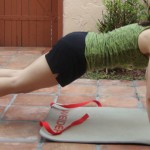The start date on my gym membership card is 4/20/2000. I was 15. My attendance was spotty those first few years, but around the time I was 19 I started going to the gym regularly. I’m in my 30s now and I don’t think I’ve ever gone longer than a week without working out. It’s in my blood.
I started off as a cardio bunny, spending 40 minutes on the treadmill or elliptical 4 to 5 days a week. I took step aerobics classes (lolol). I lost 20 lbs. Gained it back. Lost it again. I got into strength training. I had a brief stint with MMA. I did CrossFit. Now I dabble in Powerlifting.
The past 18 years of my fitness journey have been an evolution. I’ve changed a number of times and learned a ton.
Maybe you’ve yet to start a workout regimen, or perhaps you’ve already started but feel overwhelmed. There’s a ton of information on the internet–some of it good, some of it crap. So as a beginner, how do you know what really matters?
Everyone’s experience will be different. But from my time in the trenches, these are the things I wish I knew from the get-go.
Prioritize strength training over cardio.
If you genuinely enjoy cardio, then by all means, do it. But if you want body change and don’t particularly like cardio, focus on strength training. I made the mistake of spending way too much time on the treadmill the first few years of my fitness journey. My thought process was: want to lose weight. Cardio=fat loss. Only, cardio is not that effective for fat loss. And if you want a tight, sculpted look, weights are the way to go. Sometimes I think how much further along I’d be with my strength and fitness had I got into lifting when I was 19. Eventually I got into lifting weights and ended up really falling in love with it. (I may be biased, but this is a very common experience for folks who give resistance training a chance.) And it has done far more for giving me a “toned” appearance than cardio ever did.
Push for progressive overload.
In my cardio days, I messed around on weight machines, but I didn’t really know what I was doing. After losing 20 lbs I still felt that I looked flabby, so to tighten things up I started lifting free weights. But for months I didn’t progress past 20-25 lb dumbbells. I kept working out with the same weight load for far too long and my results plateaued. Then I started a basic 5×5 strength program and was introduced to the concept of progressive overload. Progressive overload is simply lifting more weight over time, and it is how you build muscle and strength. When you do the same amount of weight day in and day out, your body gets used to that stimulus and stops responding. You need to consistently expose it to new stress (i.e. slightly heavier weight) to get it to change. Doing this is what really boosted my muscle growth, which is what gives you a defined, athletic look. If you are looking for a plan that incorporates progressive overload, check out my FREE 5-week strength program.
Not being 100% on your diet isn’t the end of the world.
In my experience with fat loss and body change, the most detrimental aspect was the stress of wanting to eat perfectly, which would lead me to restrict and binge. If I could go back in time, I’d be easier on myself. I’d give myself to permission to eat any food. You might think allowing yourself to eat whatever you want would lead to insane binging, but it had the opposite effect for me. Letting go of perfectionism, although very uncomfortable, eventually gave me a huge sense of freedom. I wasn’t marinating in shame and guilt from falling short of my unrealistic expectations, which allowed me to get right back to normal eating habits after an overindulgence. Let me clarify that eating whatever I want doesn’t mean stuffing my face with fries, pizza and cookies every time I get the urge. It means being able to eat small treats here and there and be okay. No food is off limits, but that doesn’t mean filling up on processed, high-fat and high-sugar foods on a regular basis.
Having a healthy relationship with food is more important than eating healthy.
Eating healthy is important. But I think what’s even more important is your attitude about the way you eat.
You can eat healthy and still be miserable, anxious and deprived.You can eat healthy and still be miserable, anxious and deprived. In that circumstance, you are focused on what you can’t have, and even though you’re eating nutritious things, you are having a negative emotional experience. That’s not what healthy is. My first few years of losing weight and changing my eating habits were stressful because my relationship with food sucked and I had disordered eating tendencies. Because I was so preoccupied with my weight, I had a very rigid and narrow view of what my diet should look like. When I deviated from that, I would eat compulsively. And when just about everything is on your “do not eat” list, temptation is everywhere. This black and white thinking about eating healthy is what lead to yo-yo dieting and weight fluctuations. I was either on or off, good or bad. The desire for perfection created a lot of neurosis, and what good is eating healthy if it’s stressing you out?
Keep in mind that you can:
- Eat unhealthy but have a healthy relationship with food.
- Eat unhealthy and have an unhealthy relationship with food.
- Eat healthy and have an unhealthy relationship with food.
- Eat healthy and have a healthy relationship with food.
So what does a healthy relationship with food look like? This is by no means an all-encompassing list, and I’m not a therapist or nutritionist, but the general consensus is:
- You experience minimal or no feelings of guilt, even if you do overindulge.
- You enjoy what you eat.
- You have generally positive or neutral feelings around eating healthy food.
- You are able to distinguish and honor your hunger and satiety cues.
- You can resume normal eating habits after an indulgence.
- You see food as morally neutral vs “good” or “bad”.
- You give yourself permission to eat all foods in moderation.
- You have stable eating habits–you eat more or less same volume every day. (*Having some days that are calorically higher/lower is normal, but the volume trend is stable over a period of time.)
Knowing all this, what would I do today if I were just starting out?
If I were a newbie who was interested in getting in shape, I would learn as much as I could about lifting with free weights and train for strength gain. I would clean up my eating habits and aim to eat nutritiously-dense foods but not let an indulgence send me into a tailspin. I would let go of the idea that I need to be perfect. Nothing would be off-limits, but it wouldn’t be a free for all either. I would make a concerted effort to appreciate what I can eat, not what I can’t. Most importantly, I would chill out, embrace the journey and be grateful for my body at every size and stage.



